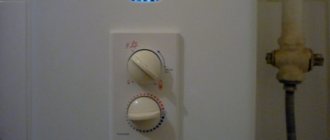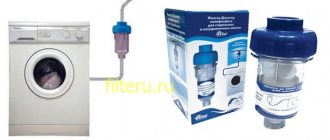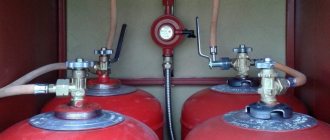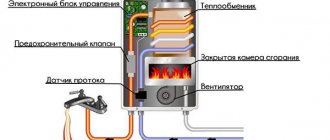Due to frequent interruptions in the supply of hot water, especially in the cold season, residents of apartments and private plots are increasingly thinking about alternative methods of heating water. The most effective of them are appliances such as geysers and electric boilers. Although they perform the same function - they heat water, they still have many differences, such as: different time consumption for heating water, efficiency in operation, and different safety parameters. Before choosing which is better: a geyser or a boiler, you need to familiarize yourself in more detail with their differences, advantages and disadvantages.
Types of water heaters and criteria for their comparison
All water heating devices for household needs are divided into 2 groups: storage boilers and instantaneous hot water columns. The first are a tank of a certain volume, where water is heated in various ways to a maximum of 75 ° C, after which it can be used. Flow-through heaters (aka columns) are designed to “on the fly” raise the temperature of the flow passing through the heat exchanger.
The main element of a storage water heating device is a tank with a capacity of 35...200 liters
The stores sell 3 types of water heating devices for private houses and apartments:
- electric and gas water heaters;
- storage boilers running on electricity or natural gas;
- indirect heating boilers.
Users are usually interested in which option is better - a gas water heater or an electric water heater, since these 2 types are the most popular.
The secret of popularity is quite simple. These household appliances are superior in quality to others: they are more reliable, more efficient and cheaper. Installing an electric speaker is more difficult - the device consumes a lot of power, so it is not suitable for installation in an apartment with old wiring or a low power limit.
Due to the absence of a tank, the dimensions of flow-through heaters are much smaller
A gas storage water heater for hot water also cannot be classified as a popular household appliance. The speaker is more convenient to use, and it’s easier to install. In turn, an indirect heating storage boiler is used in conjunction with another heat source - a heating boiler. These hot water tanks hold 100...300 liters, take up a lot of space and are offered in 2 versions: floor-mounted and wall-mounted.
We will compare an electric boiler and a gas water heater according to 3 criteria:
- equipment price;
- complexity of installation;
- ease of use.
But first, it doesn’t hurt to look at all the advantages and disadvantages of these water heating devices.
What types of heaters are there?
Boilers are divided into two main types: flow-through and storage. The latter are equipped with a tank of different volumes with thermal insulation. Water accumulates in the tank and is constantly heated using a heating element.
Flow devices are equipped with a dry heating element. Water flows through them, instantly reaching the desired temperature. This technique has great power.
Boilers can operate from different energy sources:
- natural gas;
- electricity;
- solid fuel (indirect heating).
The most popular are gas heaters and electric heaters. Which is better to choose? To understand the issue, you need to understand the principle of their operation, evaluate the advantages and disadvantages.
Gas water heaters heat water quickly using a burner. They work on the flow-through principle, so you will get a hot stream at any time, just open the tap. Gas heating devices cannot be called a new invention, but today they are especially popular. Their body is compact and has a nice design. In addition, gas is cheaper than electricity.
Electric storage devices are most often found in apartments, houses, and businesses. They are designed for a power of 1.5-3 kW. The manufacturer took care of efficiency: polyurethane foam is hidden between two layers of the tank, which retains heat. Special sensors allow you to bring water to a certain temperature and constantly maintain it.
In fact, a gas water heater is the same flow-through heater. So what is more profitable to buy?
Pros and cons of electric boilers
The operating principle of these devices is as follows: the entire volume of water in the tank is heated by an electric heating element to the temperature set by the user. Its optimal value is 55 °C, the maximum is 75 °C. To heat from scratch, it takes from 1 to 3 hours, depending on the initial temperature in the water supply.
When the maximum temperature threshold is reached, the electric boiler is able to immediately provide a large flow of hot water with simultaneous demand from several consumers. The duration of operation before cooling depends on the capacity of the tank and the flow rate. Taking these features into account, we list the strengths of storage heaters operating on electricity:
- Ability to satisfy requests for large water consumption simultaneously from several consumers.
- The operation of the device does not depend on the pressure in the water supply and the initial temperature of the water.
- Installing and connecting a boiler is much easier than any other water heater. No permits are required for installation; chimney ducts and ventilation with triple air exchange are also not needed.
- Long service life. In most models from different manufacturers, the heating element is protected by a ceramic shell and will not burn out due to scale formation.
Reference. The theoretical efficiency of electric heaters is traditionally the highest, efficiency = 99%. Although in practice, in comparison with a geyser, this advantage is difficult to assess.
The weaknesses of a storage-type water heater are the limitation of the total volume of hot water supplied and the long time it takes to heat the next portion when the reserve in the tank has been completely used. The disadvantage can be aggravated by the wrong choice of boiler by volume, then 2 options are possible:
- a device with a tank that is too large takes longer to heat up, and in standby mode wastes more electricity;
- A small container means an insufficient supply of hot water, which will not be enough for all needs and you will have to constantly wait for a new portion to heat up.
The last significant drawback is the large size of the storage tank, which plays a big role in an apartment. It is not easy to allocate space in the kitchen or bathroom for a device with a capacity of 80 liters, because approximately this volume is needed by a family of 4 people.
Advantages and disadvantages of geysers
The strength of instantaneous household gas water heaters lies in the ability to instantly heat water, you just need to open the appropriate tap on the mixer.
Moreover, the column continues to supply hot water indefinitely as long as the valve is open. It is these qualities that make instantaneous gas heaters so attractive in the eyes of users.
Let's pay attention to other advantages of geysers:
- Models with an open combustion chamber do not depend on the supply of electricity.
- Turbocharged devices with a closed chamber are economical and efficient, since they are equipped with a multi-stage or modulating burner, whose power is automatically regulated depending on the load.
- The gas heater takes up little space due to its small size. Fitting it harmoniously into the interior of any kitchen is not a problem.
The best speakers are not as efficient as electric heaters. Their efficiency does not exceed 90%, although in practice this is not noticeable.
The flow apparatus fits equally easily in the boiler room of a private house and in the kitchen of an apartment
You may ask: if everything is so good with gas water heaters, then why do many owners of private houses and apartments buy and install electric boilers? This happens due to the shortcomings of the speakers, of which there are few, but they are quite significant:
- The device produces the amount of water specified in the passport, heated to a certain value (delta). For example, a Neva 4511 gas water heater with a power of 21 kW can provide a flow rate of 11 l/min when heating water at 25 °C. If water comes into the house with a temperature of only 10 °C, then heating it to 35 °C is enough for only one consumer. And at a delta of 40 °C, the flow rate becomes much less - 7 l/min. To increase it to at least 8.5 l/min, you need more power - 28 kW and a more expensive heater.
- You can’t just buy a gas water heater, install it and connect it. It is necessary to coordinate the installation of gas-using equipment with the management company and complete the project, and for connection, hire an installation company whose personnel have the appropriate “credentials” and permits.
- When gas is burned, combustion products are formed that require disposal into a chimney duct or through a coaxial pipe.
- If the pressure in the water supply drops below a certain level, the water heater will turn off.
A chimney is required to remove combustion products from the column.
Now that all the pros and cons are well known, let's move on to choosing a water heater.
TOP 3 wall-mounted convection gas boilers
Convection options for gas boilers are considered quite compact. It is because of this that they are chosen especially often.
As a rule, this type of boiler heats small rooms, that is, it is enough for an average apartment. In addition, the ability to install on a wall makes it easy to access for use and repair.
BAXI ECO-4s 24F 24 kW
BAXI ECO-4s 24F 24 kW
Basic information:
- boiler type: convection;
- number of circuits: two;
- Max. thermal power: 24 kW;
- installation: on the wall;
- mains voltage: single-phase;
- control: electronic;
- features: built-in circulation pump and expansion tank.
Third place in our ranking is occupied by the Italian company BAXI with its model ECO-4s 24F 24 kW. This model is assembled according to European standards, which means that only high-quality materials are used.
This model stands out for its ability to provide heat to both small apartments and entire houses, which is quite convenient.
This gas boiler heats water up to 60 degrees, which is considered the optimal solution, because this temperature range is enough for everything: washing all the dishes in the house, swimming or taking a bath, even dispersing water throughout the entire heating system.
A copper heat exchanger inside the boiler will provide this very heating of water in tandem with an additional one made of chromium-nickel steel, which can resist corrosion.
It should also be noted that there is a small LED screen, from which it is easier to view the status of the gas boiler.
Overall, the model is quite good, so you can consider purchasing it.
pros
- can work not only for heating water, but also for heating;
- multi-level protection system, with which there is no need to check the status of the device;
- high efficiency of the device (about 93%);
- A circulation pump is built into the design of the gas boiler.
Minuses
- The rather large weight of the gas boiler makes the installation process difficult;
- The model is a little outdated in comparison with its contemporaries, although it is still considered reliable.
BAXI ECO-4s 24F 24 kW
Viessmann Vitopend 100-W A1HB001 24 kW
Viessmann Vitopend 100-W A1HB001 24 kW
Basic information:
- type: convection;
- number of circuits: one;
- Max. thermal power: 24 kW;
- installation: on the wall;
- mains voltage: single-phase;
- control: electronic;
- Features: built-in circulation pump and expansion tank.
In second place is the boiler model from Viessmann - the number one option when it comes to single-circuit gas boilers.
This model copes with its task - to heat water and rooms - with a bang. What is good is the low energy consumption, with which the boiler can be safely plugged into an outlet and left as is.
The temperature “segment” of this model is quite large – from +40 to +80 degrees, which allows you to take a shower or bath and wash dishes in the best conditions.
Important! This device will perform remarkably well in any climate zone, ranging from moderate to colder variations.
It is worth noting the presence of a summer operating mode, as well as a built-in circulation pump, with which this model can cope with any task set by the user.
Overall, this model is more than worth paying attention to.
pros
- multi-stage fire protection system;
- the presence of an expansion tank with a capacity of six liters, which is quite convenient;
- closed combustion chamber, so that fire does not get out;
- durable composite materials used to create this boiler.
Minuses
- the boiler is too heavy and requires several people to install it;
- The maximum pressure in the boiler is too low - only three bars.
Viessmann Vitopend 100-W A1HB001 24 kW
Vaillant turboFIT VUW 242/5-2 23.7 kW
Vaillant turboFIT VUW 242/5-2 23.7 kW
Main parameters:
- type: convection;
- number of circuits: two;
- Max. thermal power: 23.7 kW;
- installation: on the wall;
- mains voltage: single-phase;
- control: electronic;
- Features: built-in circulation pump and expansion tank.
In first place is the reliable dual-circuit Vaillant turboFIT VUW 242/5-2, with which you no longer have to think about the issue of heat and hot water.
The thermal power, of course, is slightly inferior to previous models, but it can be adjusted if necessary. For this purpose, the burner in the boiler design was made to be simulated.
In addition, you need to pay close attention to the high-quality operation of the combustion product removal system, as well as the automated smoke removal algorithm, which is responsible for this removal.
Important! Thanks to the algorithm, this boiler is installed in residential areas.
This model has several notable features:
- built-in frost protection system;
- filling valve;
- electronic ignition;
- durable copper heat exchanger.
And due to its affordable price, this model, in general, can be called the best purchase for heating small rooms.
pros
- flow mode, which provides both heating and water heating at the same time;
- an additional tank of seven liters in addition to the main 80 liters;
- high efficiency (93.5%);
- The safety level allows you to install this gas boiler in a residential area.
Minuses
- the plate heat exchanger is the most vulnerable element of the boiler (it can often break);
- the boiler is operating too loudly - the background noise increases greatly with it.
Reviews and prices for Vaillant turboFIT VUW 242/5-2 23.7 kW
What to choose - boiler or column
The first thing that worries the average user when choosing any product is the price. But an electric storage water heater and a gas water heater are completely different devices in terms of operation. This means that their cost can be compared only on one basis - the ability to provide hot water to a family of 3 people.
As an example, let’s take fairly reliable devices in the mid-price category - a flow-through heater from the NEVA brand and a 50-liter Gorenje boiler. That's what came out of it:
Notes:
- If we take a geyser from the Gorenje brand for comparison, it will cost even less than the Neva - about 135 USD. e.
- The table shows the electrical power of the boiler, but it is almost equal to the thermal power.
Conclusion. In terms of the price of the equipment, the hot water heater running on natural gas clearly wins.
Comparison of installation and connection complexity
This criterion plays an important role because it is associated with certain costs – financial and time. When comparing, we will not take into account the cold and hot water supply; it is present in both cases. The installation features of different water heaters are described in the comparison table:
Conclusion. Although some difficulties arise when installing a heavy and large boiler, in general it is much easier and cheaper to install and connect it than a gas water heater. If desired, you can install the storage heater yourself.
Ease of use
Having analyzed all the pros and cons of operating household water heating devices, we will collect them in one list:
- The column heats the water immediately after opening the tap, which is very comfortable. The boiler takes time to prepare water - from 1 to 3 hours, depending on its temperature and tank volume.
- The storage device produces a high flow rate and supplies several consumers at once. When drawing water at 2-3 points, the column does not have time to heat the water and its temperature drops.
- A flow-through gas heater heats water indefinitely. The duration of supply from the boiler depends on its capacity.
Over the years of operation, scale accumulates in the tank and on the surface of the heating element, and the magnesium anode is destroyed
Speaking about operation, we should not forget about equipment maintenance. In this regard, a storage electric water heater is more reliable, since it only requires periodic cleaning of the tank and replacement of the anode. Gas water heaters are complex devices and not everyone can maintain and repair them.
Conclusion. It is still more convenient to use flow-through devices, provided that they have enough thermal power for all needs. Another thing is maintenance and repair; in this regard, maintaining the boiler will be cheaper.
Maintenance work on a gas-fired hot water heater should be entrusted to a specialist.
Profitable price
The purchase must be made after payment.
Photo source: 999.md In order to determine which heater is more budget-friendly, it is necessary to take into account a number of factors:
As a rule, the cost of a column with installation conditions is practically more expensive than installing an electric boiler. At the same time, energy costs are higher for an electric water heater, due to the fact that blue fuel in our country has a fairly moderate tariff.
The ability to independently repair the heating device; in this matter, the boiler has more advantages, since they practically work without breakdowns.
Purchase prices for geysers and electric boilers are approximately at the same level, but an electric heater can still be purchased a little cheaper.
It goes without saying that this comparison is very conditional, since the cost can very much depend on the popularity of the brand, equipment and other parameters that affect the price.











